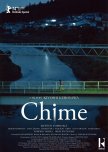
Shocks as sharp as a knife
Keeping its secrets guarded and living off the shocks of its knife-edge turns, Chime sees Kiyoshi Kurosawa covering more than familiar ground with plenty of desolate moodscapes, recognisable for anyone with even a cursory knowledge of his past output. However, there is something particularly chilling about the oppressive mundanity here, a mundanity to which Kōichi Furuya's digital cinematography adds another layer of dread. It's a dreary madness that slowly begins seeping into the life of its character. Despite its skeletal form and brief runtime, the film ends on a fascinating rupture; the previously ambient evil becoming tangible shifts, terrifyingly, within the realm of possibility and the suggestion of this curse being made concrete becomes overbearing. Relishing in the awful psychological residues of violence while suggesting a lucid dream, the kind of fragmented nightmare you are grateful to wake up from but just as terrified to leave so unresolved.Was this review helpful to you?
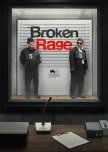
Kitano does what Kitano does best
Can't believe this got shadow-dropped onto Prime a few days ago and I'm only just learning about its release now 😭... Takeshi Kitano may be in his twilight years but that's not stopping him from doing what he loves and doing it well, with Broken Rage he paints a rollicking self-portrait of himself; an artist rethinking his relationship with the medium he's mastered and having a decidedly grand time in the process. It's a remarkably clever tactic to initially convey your story one way, only to backpedal in the second half and present it in a completely different style; it's a move that massively pays off and delivers some prime Kitano hilarity; tackling the two genres he's always been most known for, starting from a drier deadpan before rebooting into unbridled absurdity, a concise lesson in parody, creating a simple form and then breaking it with the subtle force of a sledgehammer through wood on a nail bed. In many ways, it can be seen as Kitano mocking the current filmmaking climate we live in, poking holes in everything and everyone he can, a perfect amalgamation of his works distilled into a crisp 66-minute runtime. It is a significant departure from traditional storytelling, that pays off tenfold in many ways with Broken Rage adhering to the two most significant adages in show business: always leave them laughing and wanting more; it's utterly hilarious, Kitano knows it and embraces it delivering both a love letter to himself and his fans while also ridiculing both.Was this review helpful to you?

HK cinema is back baby!
I'm so happy to see a modern Hong Kong film that remembers it's a Hong Kong film and not a pretender to the throne, an action-packed homage to the nitty-gritty choreography-crazed neon-daze of '80s Hong Kong cinema, Twilight of the Warriors: Walled In is a long overdue and very welcome dose of ass-kicking goodness, hopefully signalling the start of a new wave. Packed with wall-to-wall bone-crunching, wall-shattering mayhem, dizzying feats of acrobatics and martial arts madness, the film might be a bit long but it's extraordinarily stylish, seamlessly edited and viscerally exciting. It's all directed to masterful effect by Soi Cheang, his nimble camera swimming through the walled city with a hyperkinetic frenzy that balances the excellent action that brings you closer to the edge of your seat with every punch and every kick and the misery enacted by neo-liberalism and cold vicissitudes of fate. A bittersweet dystopian canvas, but also the purest action machine built on the choreographed denial of physics. The cast is all excellent with veteran stars Louis Koo and Sammo Hung giving as good as they get, however, it's Philip Ng who makes the biggest mark as a cackling villain with supernatural abilities, even if his ascension to villain doesn't feel entirely warranted. The musical score by Kenji Kawai is utterly joyous and so typical of his masterful touch, I especially loved the use of Walking in the Air as part of the underscoring. If anything, Twilight of the Warriors: Walled In proves that Hong Kong cinema is far from dead, and not every film the country produces has to be subjected to a Mainland committee's scrutiny. It's easily one of the best action films of the year and I'm annoyed it took me this long to watch it.Was this review helpful to you?

Rest in peace Kenpachiro Satsuma, your spirit will live eternally.
To say that Godzilla Minus One is my most anticipated movie of the year is a severe understatement. It currently holds the candle for my most anticipated movie ever. The wait has been agonising, less so for my brother who I brought along for what is our first experience seeing Godzilla on the big screen. For the better part of December seeing Letterboxd members gushing about it has been terrifying. But finally, I managed to catch a screening today, 2 days after its UK debut, by god, it was worth every minute, every second... this is the best Godzilla movie to date, bar none.Feeling as if he unfairly cheated death too many times, Shikishima, a surviving Kamikaze pilot is attacked on Odo Island along with many war plane engineers by an enormous monster. After the engineers die due to Shikishima failing to distract the monster, an overwhelming amount of guilt weighs on him, especially after a homeless woman and a baby move into his home when he returns. Shikishima, now on a personal mission, teams up with a large group of veterans to finally take down the monster known only as Godzilla.
Having spent the better part of a week watching Takashi Yamazaki's other directorial efforts certainly didn't prepare me for what he would bring to the table with Minus One. Choosing a post-war setting for the movie invited some rather minor scepticism but the film ended up an extension and refinement of his earlier wartime epic, The Eternal Zero. Tension and redemption run high throughout this film, with everyone seeking a path forward in the face of utter destruction and hopelessness.
Yamazaki's proficiency for human drama was not in question, having watched his Always Sunset trilogy the other week, emotions run high and his characters inject so much life and soul into the picture. It's backed by an utterly terrific script, heartfelt and often awe-inspiring and his calling his direction anything less than superb feels wrong.
I still can't believe that Yamazaki and company pulled this off for the money they had, either Hollywood blows their film budgets in all the wrong places or Japanese VFX artists are severely underpaid for the job they do (maybe it's both). Godzilla is one scary-looking bastard, taking his main influence from the Heisei suits but blown up with scales and spikes added into places you didn't know he had, his presence throughout the film is one of constant overhanging dread, cropping up when the characters least expect him and terrifying all who see him. Seriously, the build-ups to his atomic breath gave me constant goosebumps and seeing him standing amongst the ruins of Ginza just sent shivers down my spine.
I could technically accuse Yamazaki of nepotism given how many of his regulars take on roles here but I'm not going to. Everyone gives it their all, especially given the immense weight they had to carry on their shoulders, everyone is incredible, I can't fault a single performance. Ryunosuke Kamiki especially did a stellar job, the emotional resonance of his dialogue leaves you hanging on every word, Minami Hamabe is the rock to his PTSD-ridded life and the two of them share beautiful chemistry.
Naoki Satō's music is just phenomenal, his music carries so much menace and unease but thoroughly compliments Yamazaki's incredible style, there's a beautiful use of pure silence (especially in the climax) to emphasise both creative forces. His utilisation of the classic Ifukube cues is hands down one of the best of the entire franchise, cropping up at just the right time to not feel out of place or irrelevant.
Godzilla Minus One is truly the first of the franchise to make me truly afraid, the Big G's villainous stance hangs over the picture with a looming dread that remains unshaken even when the credits roll. Putting the trauma of history at its core was an inspired creative choice, evoking the original film more than any other since GMK (which Yamazaki lists as his favourite, based). Everything about this film works and exceeds any expectations I had of it, with its emotional heart just as prevalent as its terror. I'm so glad my brother was along for the ride, no way I was experiencing this alone.
Was this review helpful to you?
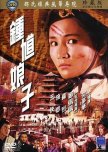
A vision of vengeance
A truly intoxicating blend of wuxia fantasy and revenge melodrama, The Lady Hermit revels in cruelty, beauty, and moral extremity. Stripping back an otherwise familiar formula to its barest essentials, there's something to be said about the film's execution that makes the following of said formula ultimately redundant, retaining all of its heart. There are plenty of quintessential Shaw Brothers staples, whether it be lavish sets, saturated colours, or a theatrical artificiality that paradoxically heightens the violence. However, it's thanks to director Ho Meng-Hua that it all happens with a tremendous amount of style and flair. Despite the film's love triangle occasionally threatening to disrupt the impeccable pacing, it's handily compensated for by a truly rousing finale, rife with arterial sprays. The action is all executed to a high standard, filled with rhythm, pose and shock. The violence is sudden and severe, often lingering just long enough to be uncomfortable, reflecting the film's bleak worldview. Even moments of triumph feel poisoned, as if every victory costs something irretrievable. This is not about justice; it is about annihilation. The film certainly benefits from a set of great performances; Cheng Pei-Pei is certainly unforgettable in the titular role, while Lo Lieh is always a treat; however, the show is stolen by Shih Szu. She conveys a striking emotional arc, moving from vulnerability to near-emotionless precision, embodying a protagonist who has consciously sacrificed humanity for vengeance. Notable for its depiction of female rage and power at a time when the genre was still largely male-dominated, The Lady Hermit is a haunting and often unsettling experience, trading heroic romanticism for bitterness and blood. A vision of vengeance that acknowledges empowerment while simultaneously questioning its price, suggesting that survival in a corrupt world may require becoming monstrous oneself.Was this review helpful to you?

Dreams really do come true
Tsui Hark's love letter to the classic screwball comedy and giddy genre mash-ups of Classical Hollywood, it's impossible not to be carried along by Shanghai Blues' delirious rush of silliness and delightfully vibrant mix of slapstick, sweetness, and song. Pure magic from beginning to end. As always with this tireless filmmaker, the pace never lets up, and the screen is constantly awhirl with colourful movement. Thanks to the persistent abuse of the starburst filter and soft focus at every opportunity, the cartoonish slapstick is balanced with carefully crafted set pieces and a sincere wistfulness beneath a youthful touch of punkish anarchism. The screenplay shamelessly deploys fate to manipulate events into a pleasing narrative, while the actors deliver their lines in a manner reminiscent of American pre-code cinema. The trio of likeable leads does a marvellous job guiding us through the insanity, heightened to the point of satire, that ensues throughout Shanghai Blues. Meticulously crafted and saturated in vivid colour, this is a world where even the most lofty dreams can come true.Was this review helpful to you?

Merry Christmas
Unattainability. No other word so clearly defines Merry Christmas, Mr. Lawrence. Unattainable pursuits for perfection, connection and forgiveness. An affecting and hauntingly beautiful experience about finding common ground even in the most hellish of circumstances, an undercurrent of revolutionary discourse in masculinity subversion bubbles furiously throughout the film deepening its already poignant lamentations about war's humanity-stripping effect and the self-imposed prisons that are obsession, honour and shame. Cultural divide and human nature encapsulate Nagisa Ōshima's film and one that he directs with the utmost care and attention, every shot is purposeful and framed with an immaculate beauty. It's relentlessly grim, constantly off-balance, periodically moving and continually striking thanks to Tōichirō Narushima's enchanting photography. There's a certain mystical quality to the performances of Bowie and Sakamoto both as arresting as each other, most likely a causality of their star power as musicians. However, it's the all-too-human reflections of Kitano and Conti that make this a true tearjerker with the duo sharing the film's final and most powerful moment, sometimes all it takes is a "Merry Christmas" to get the tears flowing. The real kicker for many is the film's utterly intoxicating musical score by Sakamoto; it stays with you long after viewing, conjuring up an atmosphere of regret, lost love and repressed heartbreak that we see in Yonoi's unrequited love for Celliers bloom. One of the most powerful pleas for tolerance ever committed to celluloid, Merry Christmas, Mr. Lawrence is one of the most captivating and mournful looks at the atrocities man commits to himself, so much is said without words, sometimes just emotions are enough. One that acquires depth and emotional scope the more you dwell on it, I should know, I've been thinking about this film since I first watched it two years ago and it's every bit a masterpiece now as it was back then.Was this review helpful to you?

Truly mad
Picking up shortly from where the first film left off, A Chinese Ghost Story II is a very entertaining sequel, one that amps up the horror, comedy and special effects wizardry. Providing the same type of action and romance that made the first film so popular, this sequel has its faults because it can't match the first film's originality or ability to surprise. Still, as Tsui Hark's thinly disguised response to Tiananmen Square, the film works wonders, criticising authorities and reflecting on the meaning of hope. This is a film made to go all out to please and thrill an audience. All stops are ignored in this wild rollercoaster, one with stunning colour and photography, wild changes of pace and characters suddenly and unexpectedly changing form all over the place. Surrealistic scenes, gorgeous music, suspenseful situations and imaginative production designs accompany the great performances by the cast. Although A Chinese Ghost Story II is very good, it doesn't quite compete with the amazing beauty of the original, regardless, this is still very worth checking out for something a little bit more mad.Was this review helpful to you?
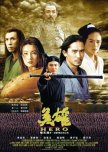
Questionable stance but oh so beautiful
For all of Hero's striking use of colour and landscapes, the drama, characters and ideas are not sufficiently compelling enough to sustain the martial arts. It's easy on the eyes, but too segmented to gather much momentum and too art-directed to convey much urgency. However, I can't deny the result. Both thrilling and thoughtful, offering imaginative and meticulous set pieces as it considers questions of loyalty and the individual's role in history. It is not so much a historical epic as a kind of highly determined ballet: dreamy with bloodless violence, relying less on shades of character than on magnificence of gesture. For all my grievances, the performances of its leads are captivating, Dun Tan's score mesmerising, while Christopher Doyle's photography is overwhelmingly stimulating. Hero is a dazzlingly lensed, highly stylized meditation on heroism even if its ideology is confused.Was this review helpful to you?

Understands loneliness better than most films bother to try
I don't think a film has ever left me smiling and laughing, then shifting to uncontrollable sobbing, so many times before. There was a particular point in Rental Family wherein Brendan Fraser's character is asked if he'd ever consider using the same service he's providing to so many other people; it really got me thinking about how much I miss members of my own family and what I wouldn't give to see them again, however brief, for one more time. It understands loneliness better than most films bother to try. There's a beautiful sense of heart and deep emotional love at its core, daring to ask what it really means to interact with fellow humans and how the roles we play in life shape our reality and our perception of it. It all bathes in a subdued light: low lamps, quiet kitchens, rainy streets that blur into bokeh, Tokyo is a presence, not oppressive, just honest, a city of people close yet worlds apart. Hikari directs the film with a wonderful amount of softness, offering the comfort of a warm hug within, never becoming overly melodramatic or heavy-handed as it's all handled with tenderness and careful thought. It doesn't try to be revolutionary in its storytelling, yet for this reason, the depth of human connection we witness is tremendous. Brendan Fraser is simply phenomenal, chewing through scenes with masterful restraint. He doesn't demand the spotlight or steal scenes from equally exceptional co-stars; he elevates those around him with emotional quietness. An endearing tour of empathy, compassion and a glimpse of humanity at its best, yet equally so quietly devastating, Rental Family serves as a small yet meaningful reminder of the importance of kindness and human connection in a world that seems to be losing both.Was this review helpful to you?

Was this review helpful to you?
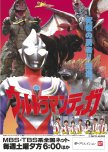
TAKE ME HIGHER!
It's taken me way too long to finish this series and I wanna apologise to my friend Garasharp for that. After small side steps into a few short-lived co-produced Ultra shows, Ultraman returned to his full Japanese roots with Ultraman Tiga marking the debut of a new full-fledged Ultra series and the first full Heisei series.After a franchise hiatus of over 15 years, set in a universe different from all previous series and updated with a new look and feel. Ultraman Tiga is basically one of, if not, the defining Ultra show. You don't need prior knowledge of any of the previous shows to get Tiga, it acts as a fresh start for the series but remains faithful and familiar to the long-time fans.
Where Tiga shines brightest is in its cast of likeable lead characters, raw emotional impact and breathtaking production values. The storytelling is up to the usual Tsuburaya quality with seemingly every episode, for better or worse, developing the characters and their own motivations over the course of the 52-episode run. The slow-burn love story between Daigo and Rena is extremely worthwhile and rewarding for those invested in the series, and the rest of the supporting cast is equally fantastic although Horii can be extremely hit or miss with his comedic antics even then he gets a satisfying and conclusive character arc.
Wildly unpredictable at times with a multitude of excellent episodes under its belt (and yes even some rather dire ones), the series is never lazy. It continues to bring out new and imaginative monsters without feeling the need to recycle and even when an old monster shows up again, it's not without reason.
Unfortunately trying to watch this series in its original format is made nearly impossible due to a long-standing and extremely strict contract with lead actor Hiroshi Nagano's talent agency, Johnny & Associates. There's a great video on why this happened by Vintage Henshin which you should all watch. It's a real shame that due to this, Tiga has been plagued by a lack of reruns, botched home video releases and even suffering from extreme cuts or outright being skipped due to the use of Nagano's own likeness.
The show's production is essentially flawless, the top-notch suitmation work combined with tight direction, scripts and fantastic musical score by Tatsumi Yano. But it's the use of Take Me Higher for the series' opening and often used to accompany the final battles of the episodes where it really gets your heart pumping, unfortunately, it's another casualty of Johnny & Associates' rules due to the fact that Nagano is a member of the band, V6, who perform the song.
There are so many stand-out episodes from the show it's hard to narrow it down to a list of favourites or best episodes, although I will attempt it:
1. The Ultra Star
2. One Vanishing Moment
3. The One Who Inherits the Shadows
4. Zelda's Point Defences
5. Dear Mr Ultraman
6. Take Me Higher! / Master of Darkness / To the Shining Ones
7. The Released Target
8. Second Contact
9. Resurrected Friend
10. Hana
The series has range and it uses it superbly well, be it introducing the first fully evil Ultra of the franchise with Evil Tiga, a self-indulgent love letter to the founding father of Tsuburaya Productions telling a story of how he met the original Ultraman or a scientist trying to live with the grief of his creation that killed his own daughter. There's a multitude of different styles and genres present in this show, catering to everyone and anyone. Even the more kid-focused stories while being the weaker ones are more than worth a look for some rather decent kid acting and storylines.
Ultraman Tiga on the whole distils everything and anything you could want or need out of an Ultraman show. Pure glowing hope and love in the face of Lovecraftian cosmic evil. No matter how dire the situation, it never relents in its depiction of its titular character as a source of optimism. My love for Tokusatsu as a whole can more than be summed up with my love for this show.
Was this review helpful to you?
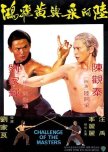
Top tier opening credits
It's fascinating that for his second film as a director, Lau Kar-Leung would choose to create his own version of the Wong Fei-hung legend, ever the visionary though, Challenge of the Masters sees Lau decide to concentrate his attentions on a young, callow Wong Fei-hung in what was a near-revolutionary statement at the time. Although the film's title implies plenty of duelling, it actually thrives less on narrative surprise and more on the sheer pleasure of watching mastery forged through discipline, pain, and stubborn will. This is not the confident folk hero of later stories, but a hot-headed, frequently humiliated young man whose talent is obvious and whose character is very much under construction. Obviously, being Lau's second film as a director yields plenty of rough edges; his filmmaking style not quite knuckled down yet. Grounding the limited action in a sense of lineage and authenticity, the few martial arts bouts that do make an appearance are to his usual standard, although they aren't the focal point of the film, as more emphasis is given to rigorous and realistic training sequences. The sequences dominate the film, staged with an almost documentary clarity; every improvement feels earned, every strike the product of repetition and refinement. Being this is Gordon Liu's first leading role, he plays Wong with an engaging mix of arrogance and vulnerability, a brilliant feat as he lets us enjoy both his cocky missteps and his gradual emotional tempering. There's a gentle humour running throughout, especially in the mentor-student dynamic, but it never undermines the seriousness of the training or the respect for tradition. While the simple narrative thrust of Challenge of the Masters is enough for most filmmakers, a director of Lau Kar-Leung's lustre requires something a bit meatier to get his teeth into, yet the film still manages to offer up a well-balanced combination of action, drama and moral philosophy, albeit with repetitive redundancy and some wobbly pacing. Opening credits are top-tier, though.Was this review helpful to you?

Not enough Wong Jing-ness
Offering up a weird, part quasi-spiritual sequel to his own remake of Buddha's Palm and part spoof of the whole phenomenon, Taylor Wong's Kung Fu Vs. Acrobatic is a gloriously scrappy feast of pure adrenaline, minimal budget and maximum commitment. Far from polished and definitely not subtle, there's an attempt at crafting a modern-day homage to the black and white Chinese fantasy flicks of yesteryear; unfortunately, that all seems to have been thrown out from the moment the opening credits have finished rolling. The film has all the right ingredients for a lively, engaging romp, but the concept seems to have been stretched to 100 minutes, which ultimately feels longer than anyone on set had material for. It definitely feels like the sort of film that Wong Jing would have been better off directing himself, as Taylor Wong's direction is fine for what it is. It just leans way too far into uninspired slapstick, complete with obnoxious sound effects, despite the presence of a few good jokes, Yuen Wah's hitherto unheralded break-dancing skills and the sudden appearance of a mystical hammer-wielding cartoon ninja turtle. The action certainly speaks louder, and the film's cast is clearly putting in more effort than necessary, with Andy Lau having a limitless amount of charisma to burn, and the gorgeous Joey Wong is merely reduced to window dressing, presumably drumming her fingers whenever she's offscreen. Ultimately, despite some genuine enthusiasm here and there, Kung Fu Vs. Acrobatic amounts to little more than daft fun; had it been made a couple of years later, perhaps it would have found better luck, but as it stands, it's a lacklustre, oddly disheartening send-up of films that were far wittier and imaginative.Was this review helpful to you?
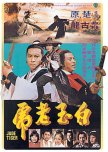
Beautifully cruel and deeply pessimistic
Exploring the merits of loyalty with an almost Shakespearean level of intrigue, The Jade Tiger is a stylish, labyrinthine wuxia mystery that delves deep into its obsession with deception, hidden identities and psychological gamesmanship. Less concerned with heroic purity than with paranoia and moral rot, the film plays more like a martial-arts whodunit, rather than any form of traditional wuxia, where every character is lying, manipulating or quietly preparing to betray someone else. Plunging headfirst into a web of false alliances and shifting motives. Heroes are rarely what they seem, villains are disturbingly charismatic and the line between justice and cruelty is intentionally blurred. The story can feel convoluted, sometimes aggressively so, but the confusion only adds to the film's atmosphere, mirroring the characters' own inability to trust anything they see or hear. This is a world where intelligence is more dangerous than strength, and virtue offers little protection. Directed with near effortless style by Chor Yuen, the film benefits from some exceptional visual design with plenty of fog-bound sets and blood red suns leaking into the running time, interiors feel claustrophobic and theatrical, while compositions emphasise screens, doorways and layers that only add to the theme of concealment. The action is sharp, with way more exploding fake eyeballs and hidden blades within a blade within a blade than you'd expect in a period swordplay picture, but secondary to the mood; it all often arrives suddenly and ends brutally, violence seems inevitable once secrets surface. Performance-wise, Ti Lung is his typically reliable self, while Lo Lieh is deliciously villainous; equally, the beautiful Lily Li is easy to appreciate, and Yueh Hua brings plenty of stoic intensity. While it's certainly thematically darker than your average Shaw Brothers film from this era, what truly distinguishes The Jade Tiger is its cynicism in a way that's beautifully cruel and deeply pessimistic, suggesting that the martial world is already poisoned beyond repair.Was this review helpful to you?









